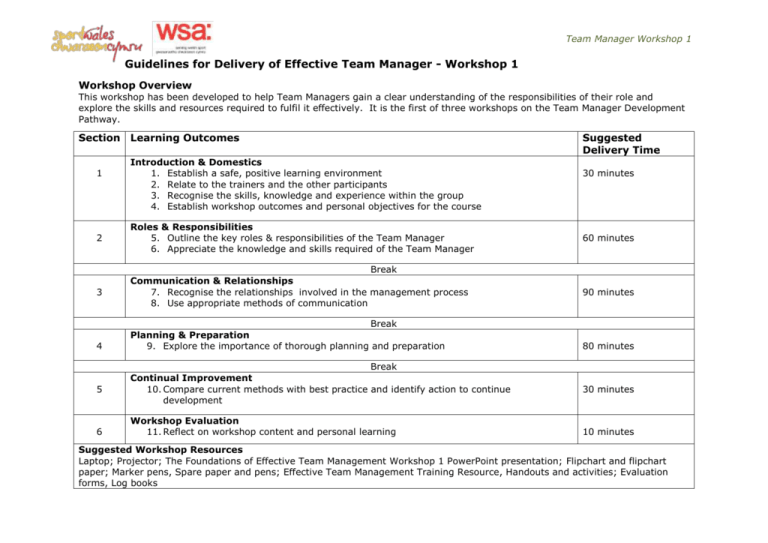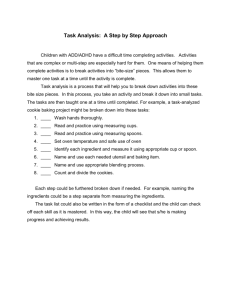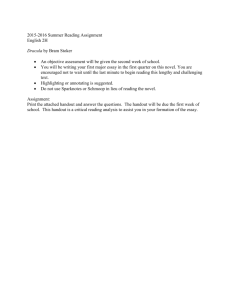Guidelines for Delivery of Effective Team Manager
advertisement

Team Manager Workshop 1 Guidelines for Delivery of Effective Team Manager - Workshop 1 Workshop Overview This workshop has been developed to help Team Managers gain a clear understanding of the responsibilities of their role and explore the skills and resources required to fulfil it effectively. It is the first of three workshops on the Team Manager Development Pathway. Section Learning Outcomes 1 2 3 4 5 6 Introduction & Domestics 1. Establish a safe, positive learning environment 2. Relate to the trainers and the other participants 3. Recognise the skills, knowledge and experience within the group 4. Establish workshop outcomes and personal objectives for the course Roles & Responsibilities 5. Outline the key roles & responsibilities of the Team Manager 6. Appreciate the knowledge and skills required of the Team Manager Break Communication & Relationships 7. Recognise the relationships involved in the management process 8. Use appropriate methods of communication Break Planning & Preparation 9. Explore the importance of thorough planning and preparation Break Continual Improvement 10. Compare current methods with best practice and identify action to continue development Workshop Evaluation 11. Reflect on workshop content and personal learning Suggested Delivery Time 30 minutes 60 minutes 90 minutes 80 minutes 30 minutes 10 minutes Suggested Workshop Resources Laptop; Projector; The Foundations of Effective Team Management Workshop 1 PowerPoint presentation; Flipchart and flipchart paper; Marker pens, Spare paper and pens; Effective Team Management Training Resource, Handouts and activities; Evaluation forms, Log books Team Manager Workshop 1 Workshop Delivery Plan Section Time Learning Outcome 1 30 min 1-4 Method & Content Tutor led introduction session Tutor introduction and welcome Outline domestics, safety procedures and workshop information. Run an icebreaker to encourage interaction and introductions Distribute Training Resource, action planner and Log books Give overview of Team Manager Development Pathway Outline the key learning outcomes for the session and establish Team Managers (TM) reasons for attendance 2 60 min 5-6 Explore the roles, responsibilities and skills required of an effective Team Manager Outline some of the things people say about team managers and explain the areas that will be covered Activity 1 – Who’s your role model? Ask each TM to identify a team manager they admire from a personal, professional or sporting context; can be past or present, famous or not; dead or alive! (If it’s easier get them to consider bad examples.) Tutor could present their own example at this point to get the ball rolling. Ask each TM to write down their role models qualities and what they believe makes them so good in their role. Then list down examples of their behaviour – what they do, and say. Each TM to share their example within a small group and identify common behaviours and qualities. These could include good planning, communicating effectively, working well with others, disciplined, team focussed, attitude, confidence, drive, enthusiasm etc. Ask for feedback on qualities and behaviours and list these on a flipchart Resources Laptop, projector and Workshop 1 PowerPoint presentation Slide 1 Slide 2, Training Resource Handout Action planner Slide 3 & 4 Slide 5 Slide 5-7 Slide 8 Flipchart and pens Team Manager Workshop 1 What prevents you achieving the same success as your role model? What prevents you adopting the same behaviours as your role model? Use slide 9 to outline the roles and responsibilities a Team Manager may have to undertake 3 4 90 min 80 min 7-8 9 Slide 9 Activity 2 – Team Manager Resources Ask TMs to get into groups and consider the strengths they bring to the role, explore the resources they need to undertake their role effectively and identify the people that could support them. Explain this information will be used later in the workshop. This section identifies key relationships and the most effective means of communicating with different groups Distribute handout activity 2 Slide 10 Tutor explanation of the components that make up face to face communication using Mehrabians research Illustrate the importance of congruent communication by role playing an example, or using a video Slide 11 Activity 3 – Communication & relationships Ask TMs to get into small groups and discuss who they need to communicate with and what barriers may make communication more difficult. Then ask each group to list on Flipchart paper what they could do to make communication more effective with the groups listed – allocate 1 per group. Feedback to the whole group and add to where necessary Slide 12 Flipchart paper and marker pens Activity 4 – Communication Scenarios Allocate a scenario to each group to discuss how they would deal with the situation. Feedback to whole group and summarise using slide 14 Slide 13 Distribute handout activity 4 Video or personal demonstration Slide 14 This section explores the importance of the planning process and identifies management strategies for dealing with different scenarios Outline the planning cycle Slide 15 Team Manager Workshop 1 5 30 min 10 Activity 5 – What could possibly go wrong? Split into groups – each group recollects a time when something went wrong and analyse how they dealt with it and how it could have been handled differently. If groups struggle to come up with something use a scenario from the list for workshop 1 Feedback to whole group Slide 16 Distribute handout activity 5 Preparation – explain the 5 steps and how they relate to the planning process Slide 17 Activity 6 – Operational management In 3 groups, consider the scenario on slide 18 Group 1 – using self drive mini bus Group 2 – using coach travel Group 3 – using a pool of private cars Slide 18 Distribute handout activity 6 Activity 7 - Operational Issues Split into pairs/groups and issue a scenario from slide 19 to each group. Feedback to the whole group and add to where necessary Slide 19 Summarise by using slide 20 to outline tips for effective planning Slide 20 This section allows Team Managers to compare best practice and identify their own areas for improvement and future development Explain that they can develop their role as far as they want to depending on the level of the teams they wish to manage Slide 21 Activity 8 – personal SWOT analysis Ask each TM to think back to their answers in activity 2 and list their strengths on the handout. Once they have completed this ask them to consider the areas they would like to improve – Strengths and weaknesses are within their control Slide 22 Distribute and explain the SWOT handout Team Manager Workshop 1 Finally ask them to consider the opportunities and threats to their future development or effectiveness within their role; these are things outside their direct control, but that may still have an impact on them. E.g. What resources are available to them to help? What might hinder their progress – people, circumstances etc. 6 10 min 11 Activity 9 – Action From what they’ve done during the session ask them to identify action points for future development Ask questions to establish action Slide 23 Action planner handout issued at start of workshop Explain the next steps on the TM development pathway and the CPD activities and provide useful contacts. Slide 24-25 Workshop evaluation – distribute evaluation forms for completion by TM. TM to review learning outcomes and reflect on learning Slide 26 Distribute workshop evaluation forms Collect completed evaluation forms and thank group for participation Slide 27





